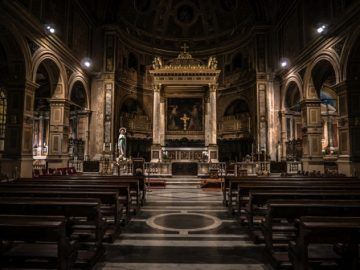Drew Pendergrass in Harvard Magazine:
 The authors’ argument goes like this. The emergence of agriculture 12,000 years ago favored societies that could work together on big projects, like growing crops. This kind of collaboration required people to be members of tightly bound social networks, strengthened by individuals who showed solidarity with one another. Families in farming societies fostered intense connection among people, because their survival depended on it: extended relatives lived under one roof, polygamy was often allowed, and people married within their own communities and families. Practices like ancestor worship and shared ownership further strengthened these bonds, both in Europe and in many farming societies around the agricultural world.
The authors’ argument goes like this. The emergence of agriculture 12,000 years ago favored societies that could work together on big projects, like growing crops. This kind of collaboration required people to be members of tightly bound social networks, strengthened by individuals who showed solidarity with one another. Families in farming societies fostered intense connection among people, because their survival depended on it: extended relatives lived under one roof, polygamy was often allowed, and people married within their own communities and families. Practices like ancestor worship and shared ownership further strengthened these bonds, both in Europe and in many farming societies around the agricultural world.
When the Catholic Church emerged, everything changed. The medieval church in western Europe promulgated unusually strict rules about families: newlyweds were often required to move to a new house, polygamy was weeded out, arranged marriages were discouraged, remarriage was banned, and legal adoption was stopped. Above all, the church harshly condemned incest. People were forbidden to marry their sixth cousins or anyone closer, as well as in-laws and “spiritual relatives” like godparents. Priests and elders would do background checks before the ceremony to uncover any hidden overlap in family trees. The motivations for these new rules are somewhat unclear, but church fathers like Ambrose and Augustine condemned incest in their writings, and various early councils saw it as an affront to God.
“I was surprised just how preoccupied medieval Europe was with the fear of incest,” said Schulz. “Natural disasters such as the plague were attributed to God’s punishment for incest.” When ministers at weddings ask if anyone has an objection to a couple tying the knot, they are drawing on a tradition that was designed to catch incestuous marriages before they happened.
More here.
